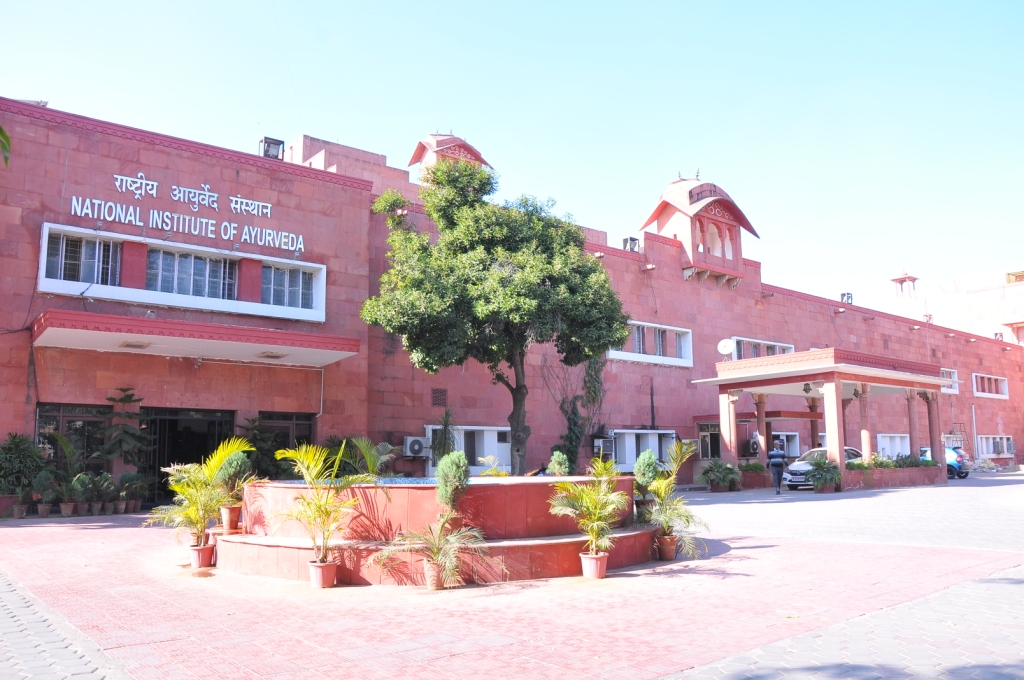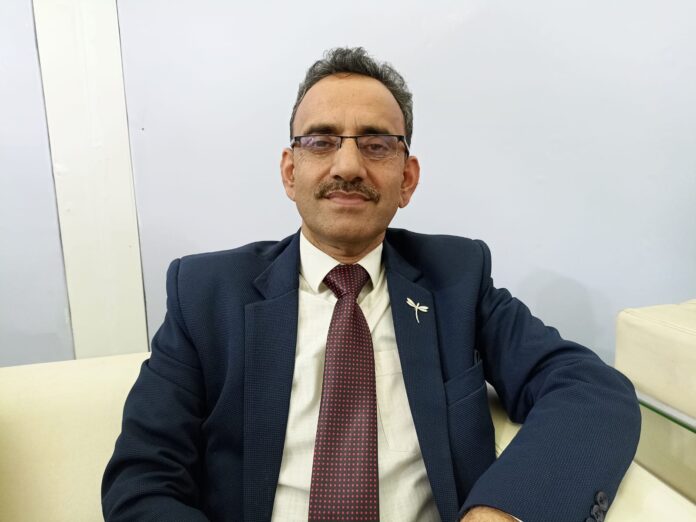The National Institute of Ayurveda (NIA), Deemed to be a University, stands as an apex autonomous institution under the Ministry of AYUSH, Government of India. Honored with Deemed University status in the De novo category, NIA was dedicated to the nation by Prime Minister Narendra Modi on Ayurveda Day, 13th November 2020. A pioneer with 175 years of legacy, NIA excels in teaching, training, research, and patient care in the Ayurvedic healthcare system. As the first Central Government-funded institute declared a Deemed University in Ayush, NIA offers comprehensive academic programs, including undergraduate (BAMS), postgraduate (MD/MS), post-doctoral (PhD), and diploma courses.
The institute conducts multi-disciplinary research in Ayurveda, covering in-vitro, in-vivo, clinical, laboratory-based, and literary studies, supported by advanced infrastructure like an animal house, pharmacognosy lab, phytochemistry lab, drug testing laboratory, and an advanced simulation lab.
During an open and insightful conversation with The Interview World at the National Arogya Fair 2024, Professor Sanjeev Sharma, Vice Chancellor of the National Institute of Ayurveda, emphasizes the crucial role his institute plays in advancing Ayurvedic research and innovation. Now, let’s delve into the key highlights from his interview.
Q: How is your institute pioneering innovation in Ayurveda to promote its global adoption and practice?
A: In the realm of innovations, our focus extends to various sectors, particularly in the realm of food products. Noteworthy additions to our lineup include organic flour and atta, as well as an array of cosmetic products. One significant development is the establishment of a unique department within our university – the Ayurveda Ahar and Poshan, translating to the Ayurveda Food and Nutrition Department. This specialized department is dedicated to instructing students on Ayurvedic food and nutrition, enabling them to disseminate this valuable knowledge to the wider population.
This establishment holds great significance, as no other Ayurvedic institution in India boasts such a department. Our commitment to innovation also manifests in diverse food products such as a blend of organic flour made from various millets and wheat. Additionally, we proudly introduce distinctive products like Triphala jam, an exclusive creation that we not only manufacture but also offer for sale. These endeavors reflect our ongoing commitment to pioneering advancements in various domains, especially in the realm of wholesome and Ayurvedic products.
Q: What factors have contributed to the evolving adoption of Ayurvedic practices among the Indian population over the years, and how has this cultural and health-related shift manifested in various aspects of daily life and healthcare?
A: The proactive stance of the Ministry of Ayush and the Government of India has played a pivotal role in spreading awareness about Ayurvedic practices at the grassroots level. This message has not only resonated within India but has also found acceptance in various other countries. The growing adoption of Ayush practices is a positive signal, aligning with the shared goal of fostering a healthy society. Achieving a truly healthy society necessitates the incorporation of Ayurvedic principles about diet, dietetics, and overall lifestyle.
Beyond the mere discussion of food, Ayurveda delves into the constituents and nutritional value of what we consume. The process of procuring, cooking, and consuming food is equally significant. Ayurvedic texts emphasize the importance of understanding when to eat, how much to eat, and the manner of consumption. Disseminating this valuable information to the masses becomes our responsibility as individuals.
Ayurveda underscores the critical importance of timing in our dietary habits. Even if the food is nutritionally rich, consuming it at the wrong time may negate its benefits, potentially turning it into a harmful substance. Therefore, adhering to the right timing for meals is paramount for maintaining good health. Ayurveda offers insightful guidelines on the appropriate quantity of food for general well-being.
In addition to the quality and quantity of food, Ayurveda introduces several other crucial factors that require attention. These factors contribute collectively to the development of a healthy body, mind, spirit, and social connection for an individual. As we embrace and promote these holistic principles, we pave the way for a healthier and more balanced society.
Q: Which global universities have incorporated the study of Ayurveda into their curriculum?
A: In the realm of Ayurveda on a global scale, only a handful of universities exist. I am aware that there are some institutions or universities in the US and UK that have started incorporating Ayurveda, albeit on a limited scale.
However, as these educational institutions become more acquainted with the profound principles of Ayurveda and its impact on dietary habits, they will certainly embrace it on a broader scale in the future.
Q: What strategic initiatives and plans is your institution currently implementing or considering to enhance and fortify research and academic studies in the foreseeable future?
A: We actively engage in a variety of activities within the academic realm, awareness programs, and research initiatives. Specifically addressing our awareness programs, we host food festivals and Arogya fairs. The National Arogya Fair is a prime example of the outcomes of such efforts.
In parallel, we are developing Information, Education, and Communication (IEC) materials for the general public. Simultaneously, a sensitization program is underway for our faculty and students. This step is crucial because, fundamentally, we need to ensure that our faculty and students comprehend the significance of our initiatives. It is only through their understanding that we can effectively convey our message to the broader public. By sensitizing our faculty and students, we are laying the foundation for them to communicate these messages to the masses. The primary objective is to foster a collective understanding, where awareness is not only disseminated but also deeply ingrained within our academic community.




This site is my aspiration, rattling great style and perfect content material.
Good – I should certainly pronounce, impressed with your website. I had no trouble navigating through all tabs and related information ended up being truly easy to do to access. I recently found what I hoped for before you know it in the least. Quite unusual. Is likely to appreciate it for those who add forums or something, website theme . a tones way for your customer to communicate. Nice task..
Somebody necessarily help to make severely posts I’d state. That is the very first time I frequented your website page and thus far? I surprised with the research you made to make this actual publish amazing. Great job!
I’d need to check with you here. Which is not something I often do! I take pleasure in reading a put up that may make folks think. Also, thanks for allowing me to remark!
I have not checked in here for a while since I thought it was getting boring, but the last several posts are great quality so I guess I’ll add you back to my everyday bloglist. You deserve it my friend 🙂
Cool blog! Is your theme custom made or did you download it from somewhere? A theme like yours with a few simple adjustements would really make my blog shine. Please let me know where you got your theme. With thanks
What¦s Happening i’m new to this, I stumbled upon this I have found It positively helpful and it has aided me out loads. I hope to contribute & assist different customers like its helped me. Great job.
I love it when people come together and share opinions, great blog, keep it up.
I like this web blog so much, saved to bookmarks. “Respect for the fragility and importance of an individual life is still the mark of an educated man.” by Norman Cousins.
Very good written story. It will be valuable to anybody who employess it, as well as me. Keep up the good work – i will definitely read more posts.
I just like the valuable information you supply on your articles. I will bookmark your blog and check once more here frequently. I’m moderately sure I will learn plenty of new stuff right right here! Best of luck for the following!
An interesting discussion is worth comment. I think that you should write more on this topic, it might not be a taboo subject but generally people are not enough to speak on such topics. To the next. Cheers
Thank you for sharing with us, I think this website truly stands out : D.
I would like to thnkx for the efforts you have put in writing this site. I’m hoping the same high-grade site post from you in the upcoming as well. Actually your creative writing skills has encouraged me to get my own blog now. Really the blogging is spreading its wings quickly. Your write up is a great example of it.
You have noted very interesting details ! ps nice site.
Woh I enjoy your posts, bookmarked! .